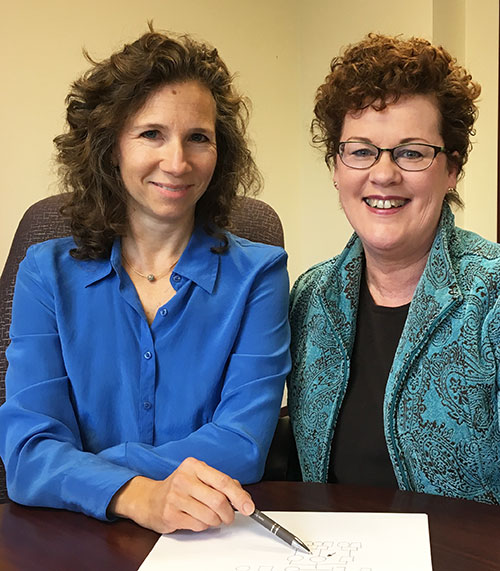Family Connections: Understanding the Genetics of Disease
Posted on
Last fall, Middlebury resident Paula Connolly attended a community education program at the Leever Cancer Center. The topic: the genetics of breast cancer. Some 3,000 miles away in Dublin, Ireland, Paula’s sister, Helen, was also engaged in a bit of genetic discovery. One of their cousins, Margaret (whose mom and sister died in their early forties), determined she would explore the possibility that faulty genes might be at the heart of the family’s common diagnosis; and she asked her Aunt Kathleen (who was diagnosed with breast cancer at age 76) if she would be willing to participate in genetic testing. Kathleen’s results revealed a BRCA 2 gene mutation.
When another cousin, Lorraine, was diagnosed with breast cancer in 2017, Helen decided it was time for her to participate in genetic testing, and she convinced Paula to do the same.
“Our mother was one of nine children,” Paula explains, “five girls and four boys. Two of our aunts died of breast cancer at very young ages, as did one of their daughters.
“After the Leever program I approached one of the presenters, APRN Yvonne Ruddy-Stein,” says Paula. “I told her about my family, expressing relief that Helen’s test was clean, thinking that covered me as well.”
Not necessarily so, said Yvonne, a certified Advanced Genetics Nurse. Yvonne explained how genetic inheritance patterns—which genes you get from your mother and which you get from your father—may vary across siblings. In Paula’s case, there was still a significant chance that she, too, could carry the familial BRCA 2 mutation. She made an appointment with Yvonne to explore that possibility through genetic testing.

and Paula Connolly.
Genetic tests look for chromosomal, genetic or protein changes in an individual’s genetic code. The results can be used to confirm specific genetic conditions that may increase one’s lifetime risk of developing cancer; they can also rule them out. According to the National Institutes of Health, more than 1,000 genetic tests are currently in use, with more in development. And while many people are familiar with BRCA testing, which looks for mutations in the BReast CAncer susceptibility genes, other cancer risks can be evaluated through genetic testing as well, including ovarian cancer, colon cancer, prostate cancer, pancreatic cancer and melanoma.
“Genetic testing is more than a simple blood draw or saliva sample,” explains Yvonne. “The process includes genetic counseling both before and after the test. Pre-test counseling involves a thorough examination of an individual’s personal medical and family histories to determine which panel of genes we should assess; we also talk about possible outcomes. In post-test counseling, we discuss the results and any ongoing management and testing plans that might be recommended.”
Thanks to Margaret’s persistence, Paula learned that other family members had also tested positive for the BRCA 2 mutation, making it one of the genes Yvonne would assess. “That a BRCA 2 mutation had already been identified in this family was not typical,” says Yvonne. “It gave us a head start, but there were still unknowns that needed to be factored in—Paula’s mother had a bowel cancer, for example, and we’re still waiting to learn the cause of death for an aunt in England.”
For Paula, the news was good: she does not carry the BRCA 2 mutation. But that isn’t the end of her story.
“Patients with negative test results don’t just walk away saying, ‘All is good, I’m never going to get cancer,’” Yvonne says. “Even if an individual does not carry a gene mutation, their personal and family histories may still elevate their lifetime risk of developing the disease. I plug that information into risk models to help make that assessment.”
In Paula’s case, the uncertainty about the cause of death for her aunt in England tipped the scales on her risk assessment. After running multiple models, Yvonne found that Paula’s lifetime risk of developing breast cancer peaked at 22.4%, nearly double the 12% risk the general population faces. As a result, Paula will add yearly breast MRIs to a screening regimen that already includes mammograms and ultrasounds.
“For me, genetic testing brought both peace of mind and important reminders about staying vigilant,” says Paula. “I know what to watch for, what to communicate to my healthcare providers and how best to advise my daughters about their health moving forward.”
Talk to your doctor to see if genetic testing is right for you.
